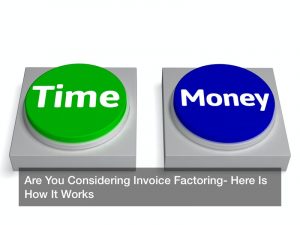
One of the biggest challenges facing a majority of the 28 million-plus small businesses in the country today is cash flow. This challenge is compounded by the fact that many banks are afraid of giving mainstream loans to finance their operations. This is mostly due to lack of well-kept records and collateral. It should, however, not discourage them from seeking other financing options.
Invoice Factoring
Invoice factoring services refer to an arrangement made between businesses and financiers in which businesses turn over their invoices to a financier in return for cash. The financier, in this case, is also known as a factor. Typically, the arrangement is made for invoices that are due in 90 days.
If you are in business, the factor gives you 80% of the invoice amount upfront. The remaining 20%, less the factor’s fee is cleared once the invoice is paid. Invoices in business to business (B2B) and business to government (B2G) transactions are considered safe. As such, most financiers prefer them over any other.
Steps in Invoice Factoring
- Deliver Goods or Offer Services
Once your client has placed an order, deliver whatever they want to their satisfaction. The client should be preferably another business or the government.
- Invoice the Client
Once the client is satisfied with the goods and services you have delivered, invoice them. The company will need to acknowledge the integrity of your invoice, and it must be due in at most 90 days.
- Sell Your Invoice
Before selling, you need to determine which one of the invoice funding companies you want to work with. It may be a bank or a company that specializes with factoring in your industry.
Once you have identified the financier offering the best invoice factoring services, you should then apply to become their client. The company will need to do their due diligence on the clients you have invoiced. This enables them to see whether they are likely to pay before they can advance business capital to you.
If the factor is satisfied with their findings, they will then require you to sign a financing agreement with them. In the initial stages, the invoice financing company you are working with will set the maximum amount you can receive through a factoring arrangement. These limits are customarily reviewed upwards as your relationship advances. Eventually, you’ll be able to factor all your invoices with them.
- Receive the Advance
At this point, you receive money for your invoice. The percentage you receive is usually 80% of the value of the invoice, but it can be less depending on the agreement between the two of you. Some risk parameters can cause invoice funding companies to reduce the amount they are willing to advance. They include, but not limited to the industry in which you are operating or the size of the transaction.
Invoice funding companies normally send notices of assignment to the clients whose invoices they have taken up. In some instances, the factor will request you to send notice to the client yourself. This notice shows that your company has designated the factor to receive payments on your behalf for that invoice.
- Your Client Pays
Your client pays the factor within 90 days or as per the terms of your invoice. The factor then pays you the invoice balance. However, it is from this balance that they deduct the agreed fee. The fees are usually a percentage of the total per month.
In Conclusion
Invoice funding companies make running a business easier in many ways. Besides helping with cash flow, they also take up the role of collecting the debt for you.
A good factoring company is careful to use the same collecting method you use so as to ensure they don’t damage your relationship with your client. There are some industries in which factoring is widely accepted. These companies include shipping where freight invoice factoring is a common phenomenon.
